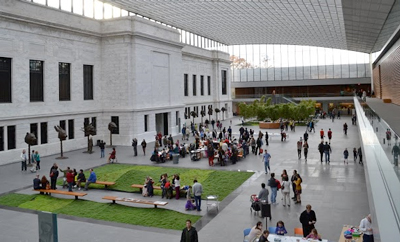By Daniel Hathaway
. Apollo’s Fire launches series of music of the Jewish & African Diasporas
. Architect of CMA’s Atrium passes in New York
. Jarrett Hoffman considers International Women’s Day
. Almanac: Many milestones, but a focus on William Walton, his violin concerto, and The Cleveland Orchestra
HAPPENING TODAY:
Today at 7:30 pm at Bath Church, Apollo’s Fire begins its run of Exile – Music of the Jewish & African Diasporas, celebrating the interwoven connections of the Sephardic, Ashkenazy, Palestinian, and African traditions. Conceived and directed by Jeannette Sorrell & featuring mezzo-soprano Rachel Weston, tenors Jacob Perry & Haitham Haidar & baritone Jeffrey Strauss with Daphna Mor, recorder, ney & vocals.
R.I.P. RAFAEL VIÑOLI, 78
The Uruguayan-born, New York-based architect Rafael Viñoly, died of an aneurysm in a Manhattan hospital on March 2. “Mr. Viñoly, a modernist, was not known for a signature style. But he did have a penchant for enclosing large spaces under glass, creating luminous interiors. His addition to the Cleveland Museum of Art, (atrium pictured above) his Kimmel Center for the Performing Arts in Philadelphia and his Booth School of Business at the University of Chicago all feature dramatic glass-roofed courtyards.” Read an obituary in the New York Times.
ALMANAC FOR MARCH 8
INTERNATIONAL WOMEN’S DAY:
by Jarrett Hoffman
“We hold these truths to be self-evident; that all men and women are created equal…” That quote comes not from the Declaration of Independence, but from the Declaration of Sentiments, the manifesto that came out of the Seneca Falls Convention of July 19-20, 1848 — the country’s first convention for women’s rights, led by Elizabeth Cady Stanton and Lucretia Mott.
The United Nations outlines the fascinating and complex history of International Women’s Day, from that American milestone through the first National Women’s Day (1909, New York City, organized by the Socialist Party of America) and several events in Europe, including the strike for “Bread and Peace” by Russian women on the last Sunday in February of 1917 — March 8 in the Gregorian calendar.
In 1975, the U.N. began celebrating that date as International Women’s Day. This year, the organization has chosen the theme of “Women in leadership: Achieving an equal future in a COVID-19 world.” The reasoning behind that choice is both inspiring and sobering:
Women stand at the front lines of the COVID-19 crisis, as health care workers, caregivers, innovators, community organizers and as some of the most exemplary and effective national leaders in combating the pandemic. The crisis has highlighted both the centrality of their contributions and the disproportionate burdens that women carry.
A separate article from the U.N. states that women “have borne the brunt of the coronavirus pandemic — from being pushed into poverty, to losing jobs as the informal economy shrinks, to an alarming spike in domestic violence and the unpaid care burden.”
One of the silver linings of the pandemic has been the time and space for society to reflect on and combat systemic racism with renewed vigor. Perhaps in that same way, some good will come of this time in the fight against systemic sexism, including in classical music.
On this day, it’s important not just to consider the challenges still ahead, but also to take the time to simply celebrate women.
REGISTRY FOR MARCH 8:
BIRTHS: On this date in 1566 (or maybe 1564, 1560, or 1561) Italian composer (and murderer) Carlo Gesualdo, in Verona, German composer Carl Phillip Emanuel Bach (2nd son of Johann Sebastian), 1714 in Weimar, English composer, pianist & conductor Avril Coleridge Taylor (daughter of Samuel), 1903 in South Norwood, American composer Alan Hovhaness, 1911 in Somerville, MA, American composer Christian Wolff, 1934 in Nice, France & Welsh tenor Robert Tear, 1939 in Barry Glamorgan.
DEATHS: French composer Hector Berlioz, 62, 1869 in Paris, British conductor Sir Thomas Beecham, 81, 1961 in London & British composer William Walton, 80, 1983 on the Island of Ischia in Italy.
UNVEILINGS: Sibelius’ Second Symphony, 1902 in Helsinki (composer conducting).
Musical selection: click here to hear a live performance of the Walton Violin Concerto by Zino Francescati and The Cleveland Orchestra, George Szell, conducting, recorded live on 25, 26, and 27 January 1968 in Severance Hall, where the work’s debut performance was played on December 7, 1939 by Jascha Heifetz under Artur Rodzinsky. Click here to read Mike Telin’s interview with Peter Otto before he played the work in March of 2022 with the Orchestra under Franz Welser-Möst. Otto was only the third soloist to be featured in the piece since its debut.




